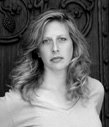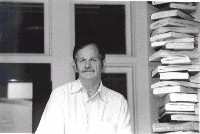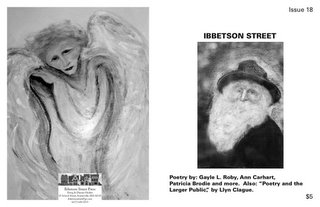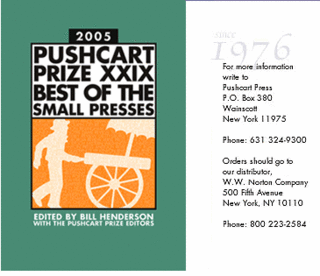
Reviewer Charles P. Ries
Wrestling With My Father By: Doug Holder 25 Poems / 42 Pages / $6Yellow Pepper Press P.O. Box 27010
Pittsburg, PA 15235
ISBN: 0-9762450-1-9 Review By: Charles P. Ries
Not surprisingly the words of a seasoned poet are a mirror of his or her nature. The structure of lines, the choice and placement of words, the use of or lack of punctuation, their application of metaphor, simile and alliteration, and of course the themes of their writing are all deliberate choices intended to lead the reader, not only to an experience of the poem, but of the writer as well. In this sense, a book of poetry is a doorway to a writer’s soul.
In Wrestling With My Father, Doug Holder allows each of us to not only meet his late father, Lawrence J. Holder (to whom the book is dedicated), but to meet the author as well. Such as in this excerpt from Holder’s poem, “A Thought On Father’s Day”: “Like him /I am drawn to the sea / to the sound of breaking waves / on the shore. / To the eternal ebb and flow / to the primal smell / of death and life. / To the gulls / mounted on the weathered rocks / to the purple death of the sun / each evening, / its bright rebirth / from the portals of the sea’s horizon. / Who is this man I see / it is my father / and it is me.”
Holder’s poems are straight-forward and without adornment. I asked him about his economy of word, “Well ...I am not about adornment, I believe in an economy of words. Too many adjectives, flowery and arcane words take away from a poem's potency. I like to tell it straight, with no chaser.” Indeed, this collection, with its lean verse has the immediacy I find in many A.D.Winans and Don Winter poems. I wondered if Holder had done extensive rewriting as these poems felt so organic. Holder told me, “For the most part no. Most of the poems have been revised to some extent, but not extensively.”
Even Holder’s replies to my questions were to the point and without baggage. Here is another example of his ability to just say it. This is titled, “To Make Time Stand Still”: “Such a desperate fetishism -- / The racks that hold / a beaten band of Fedoras. / The wing-tipped shoes / weighted, in their dark, / appointed corner -- / A dust-ridden chorus line / tapping into a parade / that has long passed. / And what light dares to intrude / meanders to a predestined / dead end. // And we rush out / to be under the sun, / and clearly see the / leather of our skin, / we breathe / deeply and begin.”
I asked Holder over what period of time he had written this collection and he told me, “This collection was brought together after my dad died two years ago. The poems were written over twenty years, and for the most part when he was alive. I had the idea for the collection after his death.”
Holder has also published four other chapbooks of poetry, he is widely published in the small press and his work has appeared in several anthologies. In the immediate future his work will be included in a major anthology of avant-garde poets, "Inside the Outside"
(Presa Press) 2006. He is also the co-founder of Ibbetson Street Press. I asked him about Ibbetson Street Press and what sort of writers appeal to him, “I founded it with Dianne Robitallle (my wife) and Richard Wilhelm in 1998. I like writers like A.D. Winans, Hugh Fox, Donald Hall. Basically my approach to poets and poetry is that if I read it, and as Auden said, it makes me cut myself while I am shaving, then I am sold.”
I have had the privilege of interviewing and reviewing many excellent small press poets. I find reviewing a specific publication such as Wrestling With My Father while interviewing the writer gives me a three dimensional sense of that writer and his work. I smiled when I got such economic replies to my questions, and I smiled again when I asked Holder, what sort of poet he thought he was. His reply was true to form, “A good one I hope.”
In Wrestling With My Father Holder uses language and technique to bring the reader face to face with a theme that is ancient, glorious, and troubled. We experience with him the emotional roller coaster of familial love with words that hide nothing. His book is an excellent demonstration of how beautiful form and function can be when perfectly matched.
Note: If you would like to learn more about Doug Holder and his work, please check out the following web locations:
http://somervillenewswritersfestival.com
http://www.ibbetsonpress.com
http://dougholder.blogspot.com
http://authorsden.com/douglasholder
____________________________________________Charles P. Ries lives in Milwaukee, Wisconsin. His narrative poems, short stories, interviews and poetry reviews have appeared in over one hundred and twenty print and electronic publications. He has received three Pushcart Prize nominations for his writing and most recently he read his poetry on National Public Radio’s Theme and Variations, a program that is broadcast over seventy NPR affiliates. Ries is also the author of five books of poetry the most recent entitled, The Last Time. He was recently appointed to the Poet Laureate Commission for the State of Wisconsin and he is the poetry editor for Word Riot (www.wordriot.org). He is also on the board of the Woodland Pattern Bookstore in Milwaukee, Wisconsin. You may find additional samples of his work by going to: http://www.literarti.net/Ries/ and you may write him at charlesr@execpc.com
















